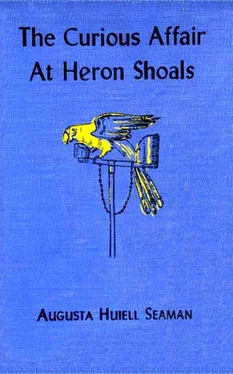Augusta Huiell Seaman - The Curious Affair at Heron Shoals
Здесь есть возможность читать онлайн «Augusta Huiell Seaman - The Curious Affair at Heron Shoals» — ознакомительный отрывок электронной книги совершенно бесплатно, а после прочтения отрывка купить полную версию. В некоторых случаях можно слушать аудио, скачать через торрент в формате fb2 и присутствует краткое содержание. Жанр: unrecognised, на английском языке. Описание произведения, (предисловие) а так же отзывы посетителей доступны на портале библиотеки ЛибКат.
- Название:The Curious Affair at Heron Shoals
- Автор:
- Жанр:
- Год:неизвестен
- ISBN:нет данных
- Рейтинг книги:4 / 5. Голосов: 1
-
Избранное:Добавить в избранное
- Отзывы:
-
Ваша оценка:
- 80
- 1
- 2
- 3
- 4
- 5
The Curious Affair at Heron Shoals: краткое содержание, описание и аннотация
Предлагаем к чтению аннотацию, описание, краткое содержание или предисловие (зависит от того, что написал сам автор книги «The Curious Affair at Heron Shoals»). Если вы не нашли необходимую информацию о книге — напишите в комментариях, мы постараемся отыскать её.
The Curious Affair at Heron Shoals — читать онлайн ознакомительный отрывок
Ниже представлен текст книги, разбитый по страницам. Система сохранения места последней прочитанной страницы, позволяет с удобством читать онлайн бесплатно книгу «The Curious Affair at Heron Shoals», без необходимости каждый раз заново искать на чём Вы остановились. Поставьте закладку, и сможете в любой момент перейти на страницу, на которой закончили чтение.
Интервал:
Закладка:
But suddenly he seemed to sense her presence and looked up from his work. In another instant he had scrambled to his feet, dropping his pad and pencil. As she involuntarily came toward him, he held out his hand shyly and said,
“How do you do? I guess you’re Marty Greene, aren’t you? I’m Ted Burnett.”
“Why—why—how did you know my name?” stammered Marty, taking his hand. She noticed that his hand, though thin and fragile-looking, had a surprisingly muscular grip. His face lit up with a little smile as he answered:
“Professor Sedgwick has told us all about you—and all about the place here. I feel as if I knew you already quite well!”
Marty was rather stunned. This was something quite different from what she had expected. Far from being the self-important young musical “prodigy” she had expected, he was just a shy young boy trying to be polite. Casting about for some suitable reply, her eye lit on the pad and pencil he had dropped, and he followed her questioning glance.
“I was just working out a little counterpoint,” he informed her. “I got tired walking on the beach and Dad thought I’d better sit here and rest, so I thought I’d work on that counterpoint Monsieur gave me to do. But I didn’t get much done. I’d rather watch the sea and the gulls and the teeter-snipe.”
Marty hadn’t the least idea what “counterpoint” was, but she glanced down at the pad and saw that it was lined with rows and rows of musical staves, on which he had been placing notes and chords.
“Who is Monsieur?” she inquired curiously.
“Oh, I thought you knew!” he said quickly. “He’s Monsieur Aubert, my music-professor. He’s up there at the Station now, having an awful time with the two pianos. He says the moving them down here put them in terrible condition.” Suddenly he changed the subject, commenting shyly, “I like your parrot—Methuselah! I’ve never been near a real, live parrot before—except in the zoo. This one talks so well—and he nearly bit my finger off at lunch time when I tried to give him a cracker. Monsieur tried talking French to him and Methuselah acted very queerly. Didn’t squawk at him at all but just sat staring at him as if he somehow were trying to understand! He’s a queer bird, isn’t he?”
This information rather astonished Marty, who had always sensed that there was something curious about Methuselah and particularly about her grandmother’s reluctance to talk about his origin. Odd that this boy should have hit on the same idea almost at once! She was about to reply that Thusy certainly was queer, when she happened to glance toward the fisherman off at the edge of the surf.
“Look!” she cried. “Your father’s just caught a big fish—I think it’s a striped-bass! Let’s go down and look at it!” And they both hurried off to join Mr. Burnett who had that moment landed his prize—a seven-pounder, and was busy disengaging the hook. Looking up, he saw the pair and called out:
“This is Marty, I know. How do you do? I feel as if I knew you very well already from Professor Sedgwick’s talks about you.” Then he dropped the fish on the sand, wiped his hands on the towel or cloth that all surf-fishermen seemed to have draped on them for that purpose, and held out his hand to Marty.
“Isn’t he a beauty?” he cried, pointing to the bass, whose jewel-like sides glittered in the afternoon sun. “Must be more than six pounds if he weighs an ounce—and he certainly gave me a bit of a battle! I promised Mrs. Greene I’d bring her back a fish for supper, but I guess she didn’t think I’d have ‘beginner’s luck,’ for she said she’d have something else anyway, in case they weren’t biting. We can all make a meal out of this fellow!” The remark about her grandmother suddenly recalled to Marty the fact that she was expected back at home directly on her return from school, so she said something to that effect and offered to carry the fish back with her, that it need not get stale lying on the sand.
But Mr. Burnett laughingly replied, “Indeed I shan’t burden you with this big fellow! A fisherman as proud as I am of his catch always wants to carry it himself. In any case, it’s getting late and the sun is well down and it’s growing a bit chilly. Ted ought to go in, too, so we’ll all go back together.”
While he reeled in his line, and strung a piece of cord through the big fish’s gills, in order to carry it more easily, Marty had a chance to take stock of this new-comer also. She decided that he was a very handsome man, big and stalwart, with a shock of arresting gray hair and clear, penetrating gray eyes. His manner was friendly and wholly natural, and she knew she was going to like him. And as they trudged back across the wide beach to the Station, she was inwardly marveling that, so far, not a word had been said about the talents of the young musical prodigy-no reference at all to his playing. Nor was there the slightest suggestion of “high-hatting anybody” (as she privately called it) or the assuming of any supercilious airs. “Maybe I was mistaken,” she thought. “Maybe it isn’t going to be like that at all!”
As they were crossing the high dunes by the path a short distance from the Station, Professor Aubert came to the door and beckoned and called to Ted to come in for a few moments to try the pianos with him.
“Run along, Ted!” said Mr. Burnett. “You can come back later with Monsieur. But don’t let him keep you too long. We don’t want to keep supper waiting!” The boy left them, and Marty and Mr. Burnett pursued their way together. As they approached the long, winding lane that led to the old house, Mr. Burnett, who had been chatting with Marty about her school activities, suddenly switched the subject and began:
“Now that Ted isn’t with us and we can be alone for a few moments, I want to have a bit of a talk with you, Marty, about that little fellow.”
“Here it comes!” thought Marty. “Now he’s going to tell me what a talented child he is!” She quite regretted that thought later.
“You see,” went on Mr. Burnett, “I feel that I know you very well, through the many fine things I’ve heard about you from Professor Sedgwick. And as the circumstances about Ted are worrying me a great deal, I feel as if I could safely confide in your good judgment. Ted is a rather peculiar little fellow. He has a great musical gift, so I’m told—I know very little about music myself—and he has inherited it directly from his mother, who was a very great and successful musician in the years before I married her. She gave up her musical career when she married me, but when she found that her little son had also inherited her gift, she devoted her time to training him in it, beginning almost from the time he could toddle. And since he seemed to be making such marvelous strides, she was planning to have him give a public recital in New York this year, when he would be twelve.”
They were midway through the lane, at this point, and Marty suddenly glanced up at his face, for he had stopped talking abruptly, and stood staring up at the tops of the close-crowding, pointed cedars burnished with the descending sun. His fine face had taken on some grim lines, but his voice was as steady as ever when he continued:
“But we had a very great loss—Ted and I—something less than a year ago. She was taken from us suddenly—a fatal automobile accident—and life will not be quite the same for either of us, ever again. It has been particularly hard on Ted. He’s an extremely sensitive child, and he adored her. After the first shock of it was over, I thought perhaps he would abandon the music, as being too painful a memory, and I planned to put him in a good boys’ school. I’ll admit that I privately hoped he would forget his music and some day fit himself for a business career; perhaps step into my own place later on, when he was ready for it. But I guess that’s not to be. He begged me not to send him away to school but let him stay at home and go on with his music. His one thought seems to be not only a real love of it, but also a desire to fulfil his mother’s ambition for him. He seemed so unhappy about my plan that I finally gave it up and engaged his mother’s former teacher, this Professor Aubert, to take up the task of his musical instruction, which he was delighted to do. Ted also has another tutor at home, to give him instruction in other studies, for I do not want his general education neglected. But he is very fond of ‘Monsieur,’ as we all call him, and so we brought him along on this little vacation. Also, Monsieur does not want Ted to fall behind with his practising, as he is to give this recital later in the fall. So that explains the two pianos.”
Читать дальшеИнтервал:
Закладка:
Похожие книги на «The Curious Affair at Heron Shoals»
Представляем Вашему вниманию похожие книги на «The Curious Affair at Heron Shoals» списком для выбора. Мы отобрали схожую по названию и смыслу литературу в надежде предоставить читателям больше вариантов отыскать новые, интересные, ещё непрочитанные произведения.
Обсуждение, отзывы о книге «The Curious Affair at Heron Shoals» и просто собственные мнения читателей. Оставьте ваши комментарии, напишите, что Вы думаете о произведении, его смысле или главных героях. Укажите что конкретно понравилось, а что нет, и почему Вы так считаете.












